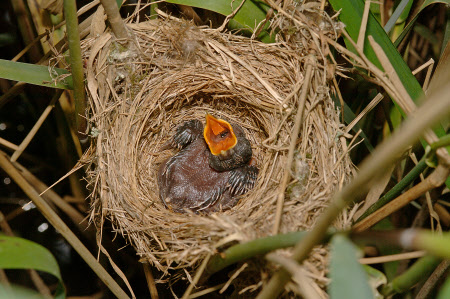Herbert Hoi and colleagues of the University of Veterinary Medicine, Vienna and scientists from the Slovak Academy of Sciences, Bratislava worked with Reed Warblers to see if infidelity was common and how it affected the offspring of the Reed Warblers. It was generally assumed that the reed warblers paired for life, however, that may not be the case. Typically, male reed warblers will try to attack and scare away other male reed warblers to keep them away from their partners. "When the female appeared to show interest in the intruder, the male behaved considerably more aggressively, both to the intruder and to his female partner". Occasionally the males will not completely scare away the others and the intruding male will intertwine with the female. However, once the eggs are hatched the male reed warbler will treat the babies as if they were their own. Scientists don't know if that is because they cant tell the difference or if they just don't care. however, they found that the females, when introduced to another male reed warbler, cared significantly less for the off spring. Scientists believe this is so because the females found that their mate was unable to ward off the intruding male, making them weaker. The weaker male would be less fit because it is not able to defend its territory so the offspring of that male would be less fit as well, which is why the female would invest lest time in the children of a weaker organism.
 Link:
http://www.sciencedaily.com/releases/2013/05/130516063752.htm
NOS Themes:
Link:
http://www.sciencedaily.com/releases/2013/05/130516063752.htm
NOS Themes:
- Science is collaborative- the scientists worked together to collect the data
- Science is based on evidence- scientists collected DNA evidence to show that there was infidelity in reed warblers
- Role of motivation and curiosity- the scientists must have been curious to see if reed warblers paired for life or not and the ways around that.
Hi this is a really interesting topic. I literally never would have thought about birds and the seriousness of their relationships. It also has sort of a cool tie to evolution. I found this article that talks about other human-like emotions that animals may have.
ReplyDeletehttp://www.huffingtonpost.com/2012/08/07/animals-who-act-like-humans_n_1711923.html
It is cool that scientists are still learning more about behaviors of animals. They previously thought these birds mated for life and now that they have studied them more closely they realized that it might not be true. That is really interesting to me because it shows that even though there is so much that has been discovered in science there is still so much more that we can learn.
ReplyDelete